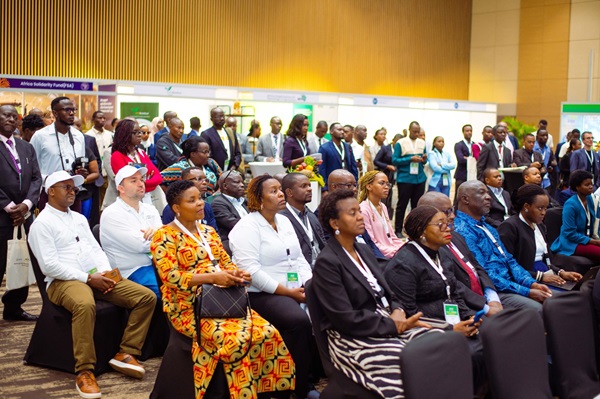
The second edition of the African Conference on Agricultural Technologies (ACAT) officially kicked off today with a strong call from leaders and experts for increased investment and deeper partnerships to support the sustainable adaptation and adoption of agricultural technologies across the continent.
The four-day event, running from June 9 to 12, 2025, is co-hosted by the Rwandan government through the Ministry of Agriculture and Livestock Resources (MINAGRI) and the African Agricultural Technology Foundation (AATF), under the theme: “NextGen Ag-Tech Solutions for Africa’s Farmers.”
“We need supportive ecosystems, including enabling policies, investments in infrastructure, and access to finance and, most importantly, we must ensure that farmers themselves have the voice and agency to shape the solutions we develop and promote,” said Rwanda’s Prime Minister, H.E. Dr. Édouard Ngirente as he presided over the official opening ceremony today in Kigali.
He urged all stakeholders present to use the ACAT platform not only to share knowledge but also to forge practical partnerships capable of scaling proven innovations and driving real transformation for smallholder farmers, whom he described as the true custodians of Africa’s food systems.
“Let us remember that technology is not just about tools and platforms, it is about people. It is about a farmer, young or old, in a rural village using a mobile phone to check crop prices. It is about a young innovator designing a drone to monitor pests and diseases. It is about a continent that believes in its capacity to feed itself and thrive,” he added.
Addressing the gathering, former Nigerian President, H.E. Dr. Goodluck Jonathan, emphasised that Africa can overcome many of the challenges currently facing its agricultural sector. However, he stressed that no single country, institution, or actor can achieve agricultural transformation alone.
“Transforming Africa’s agriculture will only be possible if countries and institutions across the region collaborate beyond borders and across sectors. Governments must work hand in hand with private sector players, research institutions, civil society and, most critically, the farmers themselves to usher in and sustain a new era of farming and food production. It is a high-paced era that leaves no room for excuses. Africa must move forward,” said Jonathan.
He underscored that the future of agriculture on the continent is closely tied to the ability to embrace and scale both existing and emerging technologies. These range from precision farming and satellite imaging to drone applications, artificial intelligence and digital tools that can revolutionise how agriculture is practised.
“We are already seeing promising innovations across the continent. In Nigeria, Kenya, Ghana and Rwanda, tech-driven platforms are connecting farmers to markets, offering weather forecasts and facilitating access to credit. Yet, for these innovations to scale meaningfully, we must invest intentionally in rural infrastructure, digital literacy, and affordable connectivity,” he said.
Rwanda’s Minister of Agriculture and Animal Resources, Dr. Mark Bagabe emphasised that prioritising the needs and preferences of farmers represents a paradigm shift. It means centring smallholder farmers, the often-unsung heroes of Africa’s food systems, in all decisions, investments and innovations. It involves listening to their challenges, valuing their traditional knowledge and co-creating solutions that enable them to improve productivity and resilience.
“Our policies and programs in Rwanda are rooted in the belief that empowering farmers with the right resources, information, and support systems is essential to achieving sustainable development,” he explained.
He noted that Rwanda’s agricultural transformation has been shaped by a farmer-centric approach, ensuring that relevant innovations are both accessible and usable by those who need them most.
The Executive Director of AATF, Dr. Canisius Kanangire, highlighted that farmer-centred technologies, when implemented within an enabling environment, significantly boost productivity, improve livelihoods, and promote economic empowerment.
“For more than two decades, AATF has coordinated public-private partnerships to facilitate the development and distribution of agricultural technologies that tackle production challenges, enhance yields, and contribute to the continent’s economic growth while improving community health and wealth,” he said.
Despite the progress made in research and technology development, Kanangire pointed out that the dissemination of these innovations to end-users, particularly smallholder farmers, remains limited. Persistent bottlenecks continue to hinder the delivery of these innovations to market, reducing the return on investment in agricultural research and undermining the impact these technologies are meant to have.
“Addressing these challenges demands deliberate, coordinated action from high-level decision-makers and institutions across the continent to optimise value chains and promote intra-African trade,” he added.
ACAT remains a critical platform for stakeholders committed to advancing Africa’s socio-economic development and food security through agricultural innovation. The conference stimulates important discussions around sustainable approaches to developing, transferring, and adopting agricultural technologies that will enable smallholder farmers to drive rural economic transformation.
The event has drawn more than 800 participants from across Africa and beyond, including government officials, policymakers, private sector representatives, researchers, farmers, women, and youth leaders. It is expected to build momentum toward implementing solutions and mobilising action around the adoption of innovative agricultural technologies that can unlock the full potential of Africa’s agricultural sector.


